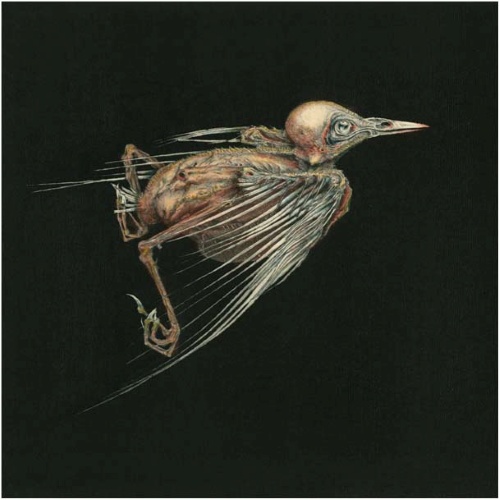The most startling moment on Meshes Of Voice occurs in the space between two songs. The exchange takes place towards the end of ‘Thirst That Resembles Me’, a live adaptation of an of a spectral song that appears on Jenny Hval’s terrifying folk flick Viscera, and the beginning of ‘I Have A Darkness’, a fucked and distorted response to the former that surveys noise like rubble and picks out remnants of Susanna’s sonorous vocals. A sound that resembles a wind tunnel begins to filter through the song, blowing behind Hval’s vocals. Susanna then takes over, interrupting her collaborator’s high flying octave by uttering nothing but the word "darkness" – as if by simply intoning this one, emptying word, she can put out a flame. The transition couldn’t be any more seamless – they’re in the same place, Hval and Susanna, the wind blowing steadily behind them – but when Susanna sings, it’s as if Hval completely disappears.
Hval goes on to sing with Susanna on ‘I Have A Darkness’, for what little of it retains decipherable vocals – but her voice no longer belongs to her. And for a lot of Meshes Of Voice, her voice can merely be converted into Susanna’s; on the first track premiered from the record, ‘I Have Walked This Body’, her voice blends into Susanna’s before you can blink. This feeds into one of the chief questions Meshes Of Voice asks: do voices merely interact, or can they do more than that? Just as melody can meet noise, or it can become it, can two voices be one?
The two artists involved in answering this question have very singular voices. Hval’s is constantly transitioning, able to fluidly metamorphose from the highest hum to the most crooked growl – able to make spoken word feel like singsong – while Susanna’s is quite steady, fit for the maudlin settings her baroque pop encounters. On Meshes Of Voice, though, what’s startling is how by going out and meeting each other, in carrying one voice over to the next, they seem to conjoin. For two such distinctive singers, I barely notice I’m listening to a vocal collaboration at all. It never feels like two voices.
At times the album feels like an attempt to take transient features of music – these vocal changeovers, as well as the different timbres of instruments, fluctuations in genre, and new contexts – and breathe them into each other, to see if they can exist in harmony. The record is interested in multiple utterances of the same ideas, just as Hval reuses the same words in her solo material until all definitions are exhausted. The first take of ‘I Have Walked This Body’ descends from ominous harmonium into a suffocating, feedback-ridden drone – transcending one hell for another – but on the second track, the tone is grander: ‘A Sudden Swing’ is made out of stark piano chords, cymbal rushes and a dominant vocal performance from Susanna. That they’re two intonations of the same song is barely noticeable on first listen. Similarly, there’s the coupling of ‘O Sun O Medusa’ and ‘A Mirror In My Mouth’, songs with the same melody and chord sequence; the move from Susanna’s commanding piano into Hval’s discreetly plucked guitar feels like an attempt to blur the lines between conscious and unconscious. The cadence separating the songs is modest, as if they could be part of the same composition, but the change in instruments is curiously obvious. It’s like the listener is being asked to notice differences at the same time as they are being made invisible to us.
Their voices aside, Hval and Susanna are wildly different musicians, so Meshes Of Voice often feels like two distinct worlds crossing over. Susanna’s baroque inclinations are often put to harsh walls of noise Hval also treated her poems with last year on Innocence Is Kinky, such as on ‘Black Lake’, which maintains a slow, contemplative pace and neo-classical leanings that recall Dustin O’Hallaran. Halfway through, the song becomes nothing but an onslaught of bitty noise, which Susanna eventually cuts through to complete her composition. It doesn’t feel forced, or all that out of place, but there’s a fascinating sense of struggle to it, as if one sound is fighting its way out of another. Despite often being a subtle and uncanny work, Meshes Of Voice also possesses this destructive quality, a feeling that these styles are rejecting one another.
Ultimately, it’s the moments of noise that separate these two artists. On Meshes Of Voice, its role is varied: it’s often a sudden force, a second suite in the duo’s songwriting that appears in medias res. Nothing builds to it, and so it never goes unnoticed. This is the case with ‘Black Lake’ – sliced between Susanna’s composition, it feels sudden, violent and characterised by nothing. At other moments, such as on ‘I Have A Darkness’, the progression feels incredibly natural, but noise is a constant reminder that this record is born as much from conflict as it is from collaboration. Hval and Susanna come together on Meshes Of Voice to make truly sublime music. At times a song can simultaneously be baroque and noise, harsh and beautiful, and the contradictions aren’t evident because their voices are one – but there are also times when the record is triumphant, precisely because they’re torn away from one another.
<div class="fb-comments" data-href="http://thequietus.com/articles/16017-jenny-hval-and-susanna-meshes-of-voice-review” data-width="550">


